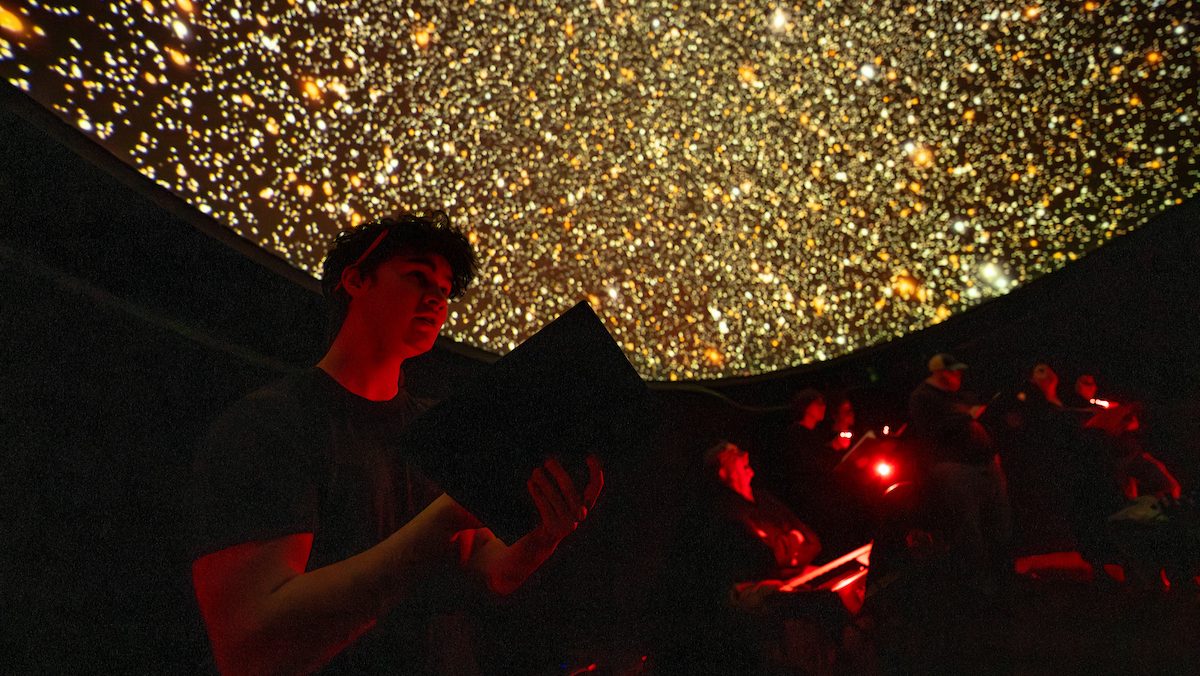
Through interdisciplinary collaboration, astronomy center helps artists reach for the stars
Many people think planetariums are exclusively designed for astronomical purposes, but they can be used to explore more than the cosmos.
Versant Power Astronomy Center Director Shawn Laatsch has a firm grasp on the conventional ways in which planetariums are utilized. He also believes that these spaces offer so much more and can share a variety of content from numerous fields.
Laatsch refers to the planetarium as a “modern visualization theater,” so it should come as no surprise that he has embraced the performing arts. That embrace has led to some compelling and unique productions taking place underneath the dome in the decade or so since the planetarium made the move to its current location. That move opened wide the doors of performance possibility — doors that Laatsch has encouraged artists to walk through.
“These types of events help us reach new audiences and expand the University of Maine’s community outreach,” he said. “The planetarium is always looking for ways to collaborate with community groups and partner on special events like this one.”
In 2016, Laatsch and other astronomy center staff joined forces with the School of Performing Arts to present a production of the play “Constellations” by Nick Payne. The show was directed by professor of theatre Marcia Joy Douglas. Its themes and structure made it an ideal fit for the unconventional surroundings of the center.
This divergence from the traditional led to some tremendous opportunities, both artistic and educational, according to theatre faculty member MJ Sedlock, who worked on the 2016 production.
“Producing a show in a non-traditional space provides a great opportunity to re-examine the way things are traditionally done and why,” said Sedlock. “Some things make sense in the new context, and some don’t. New spaces bring new ideas that make us more creative and more flexible. The effects of that mental stretching last far beyond the show, even after we’re returned to our usual theater environment.”
For Sedlock, this sort of interdisciplinary collaboration offers many benefits to the university community and people of Maine.
“Especially in liberal arts institutions, it can be difficult for students to see a throughline in their four years of coursework,” Sedlock said. “General education can feel disconnected from one’s major studies and be undervalued as a result. Interdisciplinary collaborations are the truest demonstration of the benefit of knowledge, in all forms and disciplines. They are also the best argument that can be made for the importance and worth of a liberal arts education.”
In 2020, the planetarium worked with Colby poet Arisa White to present her work titled “Who’s Your Daddy” in the planetarium. The author read her poems, and the planetarium team created unique visuals for the performance.
The astronomy center and School of Performing Arts partnered again in spring 2024 on a performance by the Collegiate Chorale vocal ensemble. A strong turnout prompted the school and astronomy center to plan another concert together to be held in the near future.
“Performing in unexpected places can challenge the conventional boundaries of music, inviting audiences to experience choral music in new ways,” said Rebecca DeWan, an assistant professor of music and the leader of the Collegiate Chorale. “Singing in public, unconventional settings potentially attracts diverse audiences who may not normally attend chorus concerts.”
The collaboration also offered unique opportunities for the singers, DeWan said.
“In a typical chorus concert, the choir is on a stage, on risers, there is applause after each piece,” she said. “In our planetarium concert, the singers were in the dark surrounding the audience. The audience’s visual attention was on the imagery on the dome while their aural input was the choral music. The performance was without applause, which allows the audience to enjoy the music in their own way. There was no requirement of the expected act of clapping.”
The value visuals can offer a choral concert is often overlooked, but thanks to the collaborative effort between DeWan and Laatsch, something altogether different — and unexpected — emerged.
“The immersive starry skies and cosmic visuals enhanced the aural experience of choral music, creating multisensory experiences for both performers and audience,” DeWan said. “Shawn Laatsch and I collaborated to weave together a set of visuals that aligned with and enhanced the specific choral works performed.”
The planetarium has had live music performances from Bangor Symphony Orchestra’s String Quartet and Brass Ensembles, the Baroque Orchestra of Maine, and composer and musician Tom Luther, to name a few musical acts.
True North Theatre, an Orono-based community theatre group that has long had a relationship with UMaine, also recently partnered with the astronomy center in a way that accentuated the “theater” in “modern visualization theater.”
True North Theater’s March 2023 production of Lauren Gunderson’s “Silent Sky,” directed by its artistic director and UMaine Division of Theatre faculty member Angela Bonacasa, was a truly collaborative effort that was years in the making, having initially been proposed back in 2019. With astronomical themes, a small cast and spatial flexibility, the production of “Silent Sky” was an ideal offering for the astronomy center. The show has also been produced in planetariums all over the country.
“Shawn was very generous with both the space and his own time,” Bonacasa said. “He brought in the designers for a tour, he reached out to other facilities that had helped produce the show, he went through all of the projections with us. Just a great collaboration.”
So much of art involves the subversion of expectations, which is easier to achieve through unique spaces and generous collaborators. As the center celebrates its 70th anniversary, Laatsch and his team will continue exploring opportunities to host more engaging interdisciplinary programming and help artists reach for the stars.
Contact: Allen Adams, allen.adams@maine.edu
